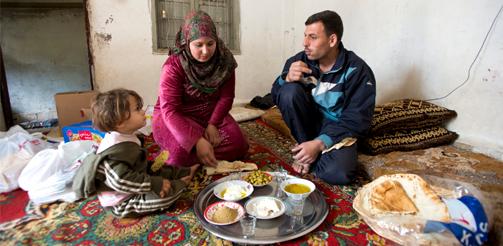Learning from the ground up with Syria’s refugees in Lebanon
Participatory research has a reputation for being lengthy, intensive and time consuming. This may seem at odds with management of a humanitarian response. But as many emergencies now last considerably longer than an average development programme the lines between development and humanitarian sectors have blurred.

Since May 2011, more than 1.1 million Syrians have crossed the border into Lebanon, seeking refuge from the conflict in their homeland. Initially present in the north of the country, they have since fanned out to the larger urban centres – the Bekaa Valley, Tripoli, Beirut and Sidon. Almost all of Lebanon’s municipalities now host Syrian refugees.
With no end to the conflict in sight, IDS and the World Food Programme (WFP) collaborated in Lebanon to pilot participatory action learning in a humanitarian setting with WFP field staff. The objective was to try and improve gender mainstreaming in WFP initiatives by engaging staff at all levels and enabling them to better understand what it means to integrate gender into their own practices and the importance of doing so.
Participatory action learning on gender mainstreaming
It is well known that using sex- and age-disaggregated data (SADD) and gender and generational analyses can to help to save lives and livelihoods in a crisis. In recognition of this WFP Lebanon has taken steps to develop its gender expertise, including the appointment of six national gender-focal-point persons, the development of an gender action plan, and collaboration with IDS on the Gender Mainstreaming from the Ground Up programme.
IDS and the international WFP gender-focal-point persons conducted scoping visits and a workshop with sub-offices in Lebanon to gain a common understanding of gender mainstreaming in WFP and to identify Participatory Action Learning (PAL) inquiries for each sub-office based on experiences from the field staff. The sub-offices and the international gender-focal-point persons worked on answering three PAL inquiries using quantitative data from WFP and qualitative field based methods:
- In the Beirut sub-office they asked, ‘Has access to purchasing power through WFP’s electronic food voucher system (e-card) economically empowered women?’
- In the Zahle sub-office they asked, ‘How have the budget cuts in WFP affected school attendance of both boys and girls?
- ’In the Qobayat sub-office they asked, ‘What are the fertility effects of the WFP safety net programme to support the most to support vulnerable Syrian refugees?’
Each WFP team worked with IDS over Skype to develop the necessary tools to help them conduct their inquiries and design a data collection strategy. The teams then set a maximum of one week aside to conduct interviews and observations. IDS staff helped with the data analysis and write up; this was done via Skype calls and week-long visits to each office.
The inquiries had some surprising results. Although WFP has an incredibly impressive digital monitoring and evaluation system, staff found that in order to answer their queries they needed to speak with a range of people to understand what the data meant, complement some data gaps and look specifically at gender and intersectionality.
Intersectionality
In response to WFP budget cuts, WFP introduced a safety net policy to protect the most vulnerable people from the effects of these cuts, providing them with a small sum of money – 13USD per month. The policy targeted -pregnant and lactating women, the elderly and non-autonomous persons. Anecdotal evidence and rumours suggested that one unintended consequence of this policy was that women became pregnant to be able to access the benefits. The Qobayat office explored if there was evidence that the policy indeed resulted in an increased fertility rate and what effects the cuts had on families. They found that the evidence of an increase or decrease in the number of pregnancies and live births was lacking, and might reflect stereotypes about Syrian refugees. They learned that the people who reportedly suffered most from the WFP budget cuts were the elderly and non-autonomous people. Elderly people reported that they felt they could not work and were burdening their families. It changed the way field staff looked at gender and the elderly:
“I pay much more attention to the elderly now. They are more vulnerable and they feel unwanted. They deserve our attention. Some older people also need a lot of care which is given to them by women” (WFP staff member, Qobayat)
The Zahle Sub-Office were surprised to learn that Syrian families thought that girls were better students than boys. If they kept their girls out of school it was often because they feared their daughters would be harassed for being both a refugee and a girl. Boys in contrast were kept out of school because they could make money for the families.
“I learned that gender roles can harm and marginalise both boys and girls – boys are forced to work for little pay and girls are forced to leave school. We need to speak with families and spend time with them to understand what is going on” (WFP staff member, Zahle)
PAL and adaptive management in humanitarian crises
PAL has helped to improve understanding or/and the implementation of programmes based on experience from WFP field staff. The findings and experiences of WFP field staff highlighted the importance of understanding the local context for mainstreaming gender and identifying how gender intersects with other social characteristics. It reaffirmed to senior management how much knowledge there is in the field. PAL can be used for adaptive management through regularly checking in with field staff and using the results of their inquiries to adjust programmes, in addition to basing decisions on regular digital M&E data.
The findings and insights from WFP staff were shared in a regional knowledge sharing meeting with the other WFP countries working on the Syrian response. These countries now plan to use PAL for gender mainstreaming in their programming.